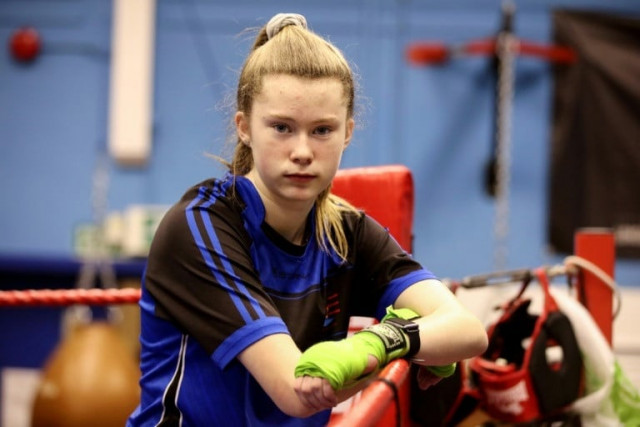Boxing club fighting sectarian divisions
Belfast academy aims to produce some of Northern Ireland's best prospects

As darkness falls on a Monday night in east Belfast, Protestant teenager Abbie Leebody is trading punches with Niamh Campbell, a Catholic.
The pair are not having some sectarian scrap, another episode of the violence that has pitted the mostly Protestant, pro-UK communities of east Belfast against mostly Catholic ones who want reunification with Ireland.
They are sparring at the City of Belfast Boxing Academy, which trains children aged six and up from both communities. From 13, they can enter the ring to spar.
After taking a quick succession of body blows, Campbell, a 28-year-old coach, returns a right jab bloodying Leebody's nose with her powder-pink glove.
Her bout with 14-year-old Leebody then ends with the sound of an electronic buzzer.
Started in 2011, the academy is aimed at overcoming sectarian divisions and channelling youngsters' energies into producing some of Northern Ireland's best boxing prospects.
Differences of religion or community could not have been further from Campbell's mind.
"I have to give her a bloody nose every once in a while to remind her to keep her guard up," Campbell told AFP.
"You don't go in thinking: 'Oh, I'm gonna hit the Protestant'... you don't really think about it that way," she said.
But 25 years after the Good Friday Agreement that formally ended three decades of violence over British rule in Northern Ireland, the communities around the academy are still defined by the old divisions.
The boxing club lies directly on the fault line between the Short Strand, a pro-Irish Republican enclave, and the pro-UK Loyalist communities of east Belfast that surround it.
A 25-foot (7.6 metre) metal fence, a "peace wall" topped with a security camera, runs along the back of the club to delineate the line dividing the two communities.
There are some eight miles (13 kilometres) of peace walls in Belfast, erected throughout the conflict in Northern Ireland, beginning in the late 1960s.
The borders of the Short Strand became a flashpoint for violence and pitched gun battles between Loyalist and Republican paramilitaries early in the conflict, known as "The Troubles".
In the years after the Good Friday peace deal, notably in 2002 and 2011, violence involving petrol bombs and paramilitary shootouts flared between the communities.
The boxing academy, located in a former Protestant primary school, can only be accessed from the Loyalist side through a heavy gate topped with spikes.
Its windows are caged and a concertina of razor wire is fixed above its main door.
Abbie, who is from a Loyalist housing estate next to the club, brushes off the divisions.
"If they're Catholic, or Protestant, that's the way they are," she says. "But obviously I like Catholics and Protestants at the same time."
Stephen Clarke, a club member and part-time coach better known as "Chips", is from the other side of the wall and can see his mother's house in the Short Strand from the club.
The 45-year-old explains that with children overwhelmingly placed in segregated schools and locals rarely interacting across the divide, the club "gets kids together".
"There's about 10 kids in there now and I couldn't tell you where any of them are from because we don't ask that question," he explained.
"The question we ask is all about boxing. It's not about where you're from or your religion or your tribe, whatever you want to call it.
"Instead of throwing petrol bombs at each other, we could be boxing with each other."
Lee Costello, another coach at the club, said it allows the boxers to "be part of a community in its own right rather than something that you're told to be a part of".
The 28-year-old added: "You know, whether it's a Catholic left hand coming at you, or a Protestant one, they all hurt."



















COMMENTS
Comments are moderated and generally will be posted if they are on-topic and not abusive.
For more information, please see our Comments FAQ